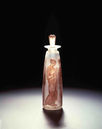Would you Be Perfumer for an Evening? - a Perfume Workshop with Daniel Pescio Perfumer
- PerfumeHeaven
- Oct 26, 2017
- 3 min read
At long last I got to attend a perfumery workshop.
Daniel Pescio, Brazilian perfumeur, living in France for 25 years now, held a workshop in Budapest so I immediately signed up.
Wouldn't you want to create your own perfume?
This is what fragheads dream of. An absolutely unique scent that only we use and we can call it our own. Now the question is, is it realistic to come up with something wearable? Will it be the way we want it to be? If we could create a notable scent in only a couple of hours' trying, why do perfumers study and hone their skills for years in Versailles and Grasse? The workshop showed the tip of the iceberg about perfumery so it was not easy to get a sense of the vast amount of knowledge there is in this field.
The Orientals Enter the Scene
Daniel started with a warm-up introduction about the category of oriental fragrances and the launch of this genre. Ambre Antique in 1908, by Francois Coty, was probably the first oriental perfume, even before the best known and perhaps most popular oriental, Shalimar by Guerlain. Note that Ambre Antique was sold in gorgeous Lalique crystal bottles - the photo gives an idea of what perfume bottles looked like only 100 years ago!

In the following years, Coty created Émeraude - Daniel Pescio kept us entertained with the anecdote of Coty's wife wearing it and Guerlain's wife asking her husband for the same frangrance. The House of Guerlain then came up with some of their greatest perfumes, such as L'Heure Bleue and Mitsouko, inspired by Coty creations: Chypre - named after the isle of Ciprus, Coty's 21st parfume creation, and Émeraude.
What is an oriental by definition? Daniel talked about the central role of the amber notes, whether it is opoponax, myrrh, benzoin or other resins. We all sniffed a paper blotter with the 20 main notes taken from the historic Ambre Antique as well as a beautiful oriental composition by Daniel, one he created for a competition in the US recently. Daniel's oriental fragrance was evaluated among the top 15 of the field in the competition.
Top - Heart - Basenotes and the Fragrance Industry
As a basic point of introduction for perfume creation, Daniel talked briefly about the olfactive pyramid, the role of volatility and how the three levels work to complement each other or how sometimes one level may even be absent, which is the case of the eau de cologne.
We followed with a bit of general discussion about fragrances. Are there female and male notes? Is the fragrance industry fooling the consumers in any way, especially related to notes, longevity, launches, perfumes for the genders...? How do we make a perfume more stable, which are the best fixing notes? What's happening to the industry versus niche houses? We did not explore the topics as it probably would have been an extremely long discussion.
The Creation
With all participants ready - set - go, we were all handed our perfume bottle filled with the alcoholic base and started to draft our fragrance ideas based on the advice of Daniel on notes as well as proportions. We all had our dearest notes on our minds, so Daniel got the noble responsibility to create some order in the chaos and weed out the notes that do not combine well, guide the amateurs in creating something balanced and potentially well-blended.
We registered the notes and the amounts of each "essai". Starting with small amounts of a few notes, we carefully tested the effect and then modified the composition drop by drop in the next test round. Some of us created their scent in 2 rounds, others took several turns and even added new notes in the last test rounds. I confess to belong to the second crowd with my neverending experiment.
Daniel gave tips to all, he knew how to turn a sour composition back to its previous harmonious state, and he helped tame the leather or smoky note that suddenly started to dominate a fragrance.
So what about the perfume we created? Looking around, everyone seemed very happy with their perfumes - hopefully the next morning the feeling was still there! Now the perfume needs to sit for at least 2 weeks so the notes blend and the final fragrance profile is born. My fragrance is a highly unusual one, probably you would find it very green and mossy, but it is my own little monster and I am more than pleased with it.









Comments